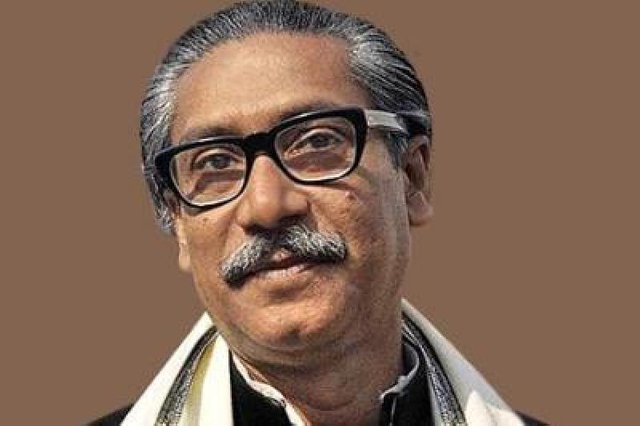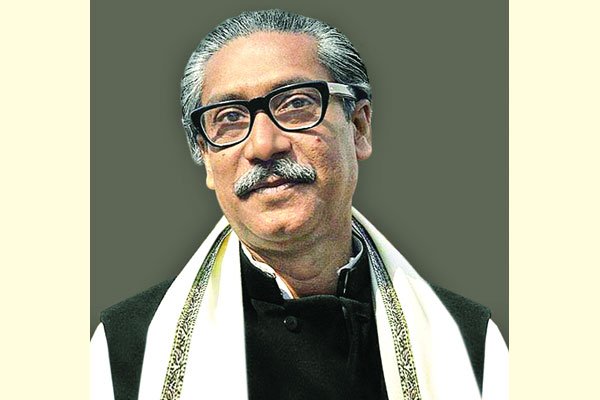Bangabandhu and Bangladesh's independence.....
To understand the political life style of Bangabandhu Sheikh Mujibur Rahman, it is necessary to investigate his socio-economic status in the chemistry of some socio-political elements. Sheikh Mujib grew up in the rural life cycle of Tungipara.


The characteristics of Tungipara, the rivers, the rivers, the cosmic, the miserable people, and the sophisticated social life. Within this life, the glory of English rule, the anti-English Swadeshi movement, the heroic political advent of Netaji Subhas Bose touched the teenager Sheikh Mujib in many ways.
During his childhood, his education was ruined during his nearly four years in the treatment of Bierbri and his eyes. As a result, he started his school life at a much older age. But it is very helpful for his political life. He was not only a leader but he was not a leader in the class, but he was also a pioneer in the political sense, interest and curiosity than other students. As a result, he was attracted to the politics of Subhash Basu while reading his father's work at Madaripur Islamia High School and at the same time he was noticed for his interest in Swadeshi movement. She is a 13-year-old teenager. In his own memoirs, he came in contact with a local Swadeshi group leader and said that his words and proceedings enlightened him.
At that time, the famous Swadeshi leader of Madaripur was Principal Purnachandra Das. The English government threw this revolutionary leader in jail. After he was released from jail, the rebel poet Kazi Nazrul Islam congratulated him and said, in a poem titled 'Full-congratulation', he called him 'Mad Bir' of Madaripur.
This incident seems to have affected the lives of the teenager Sheikh Mujib. One. The heroic hero of his area, Pratyakandra revolutionary life created a local pride in him; Two Congratulations to him, wrote the poet of the rebel youth of the Idol poet rebel Nazrul. This incident was enough to encourage the teenager Mujib. But that was not the end, that poem was later used by the word 'Jai Bangla', one of the greatest time of the life of Sheikh Mujib's untimely leader of Bangladesh's independence movement. The unpleasant sounding of Nazrul was exposed to the utterance of the teenager Mujib's voice in his speech? Was the term 'Bangladesh' used in Nazrul's other poems also been printed in the heart forever? We think so.
In 1937, after returning to his father's job, Sheikh Mujib came from Madaripur to Gopalganj and was admitted to the seventh grade in Mission High School. As far as it was known, his home tutor was an activist of anti-British independence movement Hamid Master. He suffered many years of imprisonment due to the wrath of the British government. Sheikh Mujib's Madaripur (1934) and Gopalganj-two school life seem to have played an important role in determining the goals and objectives of the next political life. In Madaripur, there is the influence of Netaji Subhas Bose and the local leader of Swadeshi movement, Purnachandra and others. And the ideals of Hamid Master's anti-British freedom movement in Gopalganj give more depth to that effect.
In the process of revolutionary politics in Madaripur and Gopalganj, after the induction of Kishore Mujib in 1938, another turning point in Sheikh Mujib's life was noticed. In that year, the Prime Minister of the Huq-League Coalition Cabinet AK Fazlul Huq, his trade and labor minister and Muslim League leader Hossain Shahid Suhrawardy came to visit in Gopalganj that year. During this tour, Suhrawardy found a potential political political talent in Sheikh Mujib's courage and conviction. This talented young man, he continues to establish Muslim League in Bengal and keep in touch with him for the purpose of using the Pakistan movement. Through this process, Hussein Shaheed Suhrawardy became Sheikh Mujib's political guru (cobbler) within the years 1940-41.
After accepting the disciple of Suhrawardy, Sheikh Mujib devoted himself to systematic politics. Initially, he took initiative to activate and popularize Muslim Chattra League of Bengal. As part of this initiative, he tried to reorganize Muslim League-affiliated Bengal Muslim Chhatra League in the light of non-communal and Bengali nationalist sentiments. To this end, in 1940, at a discussion of Muslim Chhatra League in Faridpur, poet Kazi Nazrul Islam invited the educationist-literary and nationalist political leader Humayun Kabir and the famous Principal Ibrahim Khan. The League leaders obstructed this, yet Sheikh Mujib was able to create a dialogue between many jhutjhamela. Nazrul-Humayun Kabir joined the meeting, Ibrahim khan sent the message. Later, when he joined the Pakistan movement as a student of Islamia College in Calcutta, he joined the political class of Bengal Muslim League, Abul Hashim, and got a modern pamphlet on the announcement of his party and the socio-political-political issues he made.
Two
After the formation of Pakistan, the radical group comprising Shamsul Haque-Sheikh Mujib led by Suhrawardy-Abul Hashim, a pre-Pakistan Muslim League of Bengal, is faced with intense opposition, not just ignored by the supremely conservative group. As a result, they forced the Awami Muslim League under the leadership of Maulana Bhashani (1949) as a new opposition party. After the establishment of Pakistan in 1947, the geographical location of the two parts of Pakistan, the plan of the central government to make religion the basis of the state, the plot to cripple East Bengal on the question of state language, to take shelter of self-government, to persecution and deprivation in ethnic and cultural areas, and to become isolated from East Bengal due to acute economic exploitation The chances are obvious. The young Bengali leader Sheikh Mujibur Rahman realized the matter only in 1947-48. Bangabandhu said in the first meeting of the central committee of Bangladesh Krishak-Sramik Awami League (1975): "I dreamed of independence in 1947-48. 'He further elaborated this on 19 August 1972 at the National Conference of Bangladesh Chhatra League in Suhrawardy Udyan. His statement is as follows: "In 1947 the country was divided. On the day it was not clear that in order to colonize Bangladesh, the so-called freedom has come to exploit the people of Bengal and become a slave. As far as I remember, in 1947, a domestic meeting was held at Sirajuddaula hostel in Park Road, Kolkata. ... passed BA from Calcutta and went to Dhaka. After coming to Dhaka, it was not understandable that the Bengali was over. Take oath that day, people of Bengal must be freed. The beginning of our struggle in 1947 'The Language Movement of 1948 and 1952 made the biggest contribution to the formation of secularism of Bengalis of East Bengal and the creation of Bengali nationalism. And this movement gradually took the form of the independence and independence of Bengalis. Bangabandhu said: 'The Pakistani exploitation group of 1948 hit the Bengali language .... We could not bear the injury on the language above. As a result, the BCL was born on 4 January, forty-eight. On March 11, we started the movement under the leadership of Chhatra League. ... Together with some other cultural organizations, we face the injuries of the drying group. About the Language Movement, he said: 'We need to know the correct history of language movement and language movement in 1952. I was then taken to Dhaka Medical College as a prisoner. There we have to face the fact that on our mother tongue and on my country that the country had to face it on 21 February. There was a secret meeting at all. ... It is a matter of fact, on February 16, I will strike a hunger strike in jail, and the movement will start on 21st. Fisherman meets Mohiuddin with Barisal. I told him, we took this program. He said, I too would go hunger strike. On 16th February we started a hunger strike. '
Winning the battle of language in exchange of youthful sacrifice, the Bengali people came to the main path of forming their independence and language based nation-states. In the next step, the main protagonist Sheikh Mujibur Rahman is also the main protagonist. The Observer Journal of London on March 25, 1971 after the declaration of the independence of Bangabandhu after March 27, 1971, after the crackdown of the Pakistani occupation force, Bangabandhu was written as follows: 'In 1953, the leader of the huge public rally in Dhaka in 1953 and Sheikh Mujibur Rahman was the main force. Three years later, after the formal proposal of the East Pakistan Council, Sheikh Mujib was the leader of the hero. Proposals of that public meeting and the provincial council were briefly called for almost full autonomy of East Bengal. '
In the general election of 1954 East Bengal, Sheikh Mujib was able to visualize the mood of the people, to win the landslide of the united front. But he realized that this kind of conquest of the central government's plotting against the United Front was a victory. He thought that some of the people of the Muslim League's cancellation, expulsion and conspiracy and backing the three groups of Nezam-e-Islam, would back East Bengal's main movement. That's exactly what happened in reality. The Central Government has started playing various schemes with different groups of this United Front.
Three
After the issuance of the military rule of 1958, Sheikh Mujib prepared almost the overall framework of the independence of Bangladesh. In 1961, he gave green signal to the freedom fighters of BCL members. The first publication of the leaflet titled 'Independent East Pakistan' was published by BCL's initiative. In 1966, after breaking the colonial dictatorship of Pakistan, he declared the release of East Bengal as a freedom fighter for the establishment of a new Bengali state and declared six points. The six-point program is nothing but a cunningly indispensable independence of Bangladesh. The six-point attracts extremely popular people very fast. The Bengali people of Bangladesh become a community from a nation. Bangabandhu Sheikh Mujibur Rahman has become the great hero of this nation.
In the first week of June 1966, the people fought weapon language and this was the first time that Sheikh Hasina's sacrifice left the workers of Bengal workers Agartala conspiracy case against him has come to fray. In this way, the mass movement of Utshet, the symbolic slogan 'Joy Bangla' and 'Ganobhabtpratim' in 1971, and the liberation war of 1971. These three are the warriors of East Bengal, and the three leaders are the main leader Bangabandhu Sheikh Mujibur Rahman. On February 23, 1969, a public meeting was called as 'Bangabandhu' and he was invited to the undisputed leadership of Bangladesh. Therefore, he is the very father of independent-sovereign Bangladesh.
Congratulations! This post has been upvoted from the communal account, @minnowsupport, by muktadir from the Minnow Support Project. It's a witness project run by aggroed, ausbitbank, teamsteem, someguy123, neoxian, followbtcnews, and netuoso. The goal is to help Steemit grow by supporting Minnows. Please find us at the Peace, Abundance, and Liberty Network (PALnet) Discord Channel. It's a completely public and open space to all members of the Steemit community who voluntarily choose to be there.
If you would like to delegate to the Minnow Support Project you can do so by clicking on the following links: 50SP, 100SP, 250SP, 500SP, 1000SP, 5000SP.
Be sure to leave at least 50SP undelegated on your account.
Congratulations!
This post has been upvoted from Steemit Bangladesh, @steemitbd. It's the first steemit community project run by Bangladeshi steemians to empower youths from Bangladesh through STEEM blockchain. If you are from Bangladesh and looking for community support, Join Steemit Bangladesh Discord Server.
If you would like to delegate to the Steemit Bangladesh, you can do so by clicking on the following links:
50 SP, 100 SP, 250 SP, 500 SP, 1000 SP.
YOU ARE INVITED TO JOIN THE SERVER!